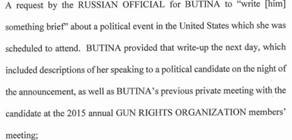The Republican Party and Russia—Infiltrated or Invited?
Special Counsel Robert Mueller’s indictment of 12 GRU (Russian military intelligence) officers and the Department of Justice’s arrest of Maria Butina both reveal that Russia’s influence campaign went well beyond just helping Donald Trump and hurting Hillary Clinton.
These indictments make clear that, even before Trump emerged as a viable candidate, the Russians were carrying out a broader influence campaign designed to infiltrate the Republican Party as a whole … which raises the question of whether Congressional Republicans have been abdicating oversight to protect others besides Trump and his team.
Butina’s alleged influence efforts took place at roughly the same time as Mueller alleges that GRU hackers began acquiring information of immense value to the GOP—information that, on more than one occasion, Republicans put to use. (Butina pleaded not guilty today in federal court).
Butina allegedly sought to build relationships with American politicians and establish a “back channel” to “penetrate the U.S. national decision-making apparatus.”
- Her efforts apparently focused on the Republican Party, which she believed “would likely” win control of the US government in 2016.
- According to Butina’s project proposal in the indictment, she described a “major U.S. political party” that was “traditionally associated with negative and aggressive foreign policy, particularly with regards to Russia.”
- She also described a gun rights organization as “the largest sponsor of the elections to the US congress” for that party and “a sponsor of The CPAC conference and other events ” – clearly the NRA.
Butina’s American co-conspirator (believed to be the Republican operative Paul Erickson) allegedly said he secured—“unrelated to specific presidential campaigns”—a “VERY private line of communication between the Kremlin and key POLITICAL PARTY 1 [REPUBLICAN] leaders through, of all conduits, the [GUN RIGHTS ORGANIZATION].”
- An obvious example of a successful backchannel would be the meeting between Butina’s alleged patron Aleksander Torshin and Donald Trump Jr. at the 2016 NRA Convention (which we may learn more about thanks to Spanish wiretaps of Torshin).
- But which Republican leaders outside of the Trump campaign were participating in “back channel” communications with Russia in October of 2016?
Butina allegedly met with Republican politicians and reported back to Moscow.
- Elements of Russia’s influence operation allegedly included meeting GOP leaders and “U.S. politicians and political candidates;” attending Republican conferences, and planning a meeting between Torshin and Rep. Dana Rohrabacher.
- Butina allegedly reported back to Moscow on her interactions, including her “private meetings” with Wisconsin Governor (and 2016 presidential candidate) Scott Walker.


- Perhaps Butina’s hard work paid off: according to the indictment, in October 2016, Butina, who had previously assessed the GOP as negative on Russia, concluded instead that “American society is broken in relation to Russia,” with the Republican Party “for us” and (presumably) the Democratic party “against.”
The indictment alleges her influence campaign continued after the election.
- Butina allegedly discussed Trump’s candidates for Secretary of State with a Russian official—comporting with an unreleased memo from Christopher Steele that’s reported to claim that Russia tried to influence Trump’s choice.
- She also attended the 2017 National Prayer Breakfast to continue building relationships. Trump and Rex Tillerson were in attendance at the breakfast.
According to the special counsel’s indictment of 12 Russian nationals, at around the same time Butina was allegedly building ties and establishing back channels with Republican politicians, the GRU was allegedly hacking and stealing troves of data from the Democratic Congressional Campaign Committee and the Democratic National Committee.
- This information that would have been highly valuable to Republican candidates and committees up and down the ticket.
- The GRU allegedly stole large quantities of data and a “large number of documents” from the DCCC, including banking information, opposition research, and field operation plans.
- The Russian hackers clearly valued their access to the DCCC as more than just a back door to the DNC because after the DCCC shut them out, they spent at least seven hours trying to reconnect.
- The hackers allegedly had access until in or around October 2016 and stole DNC “analytics” in September.
- They allegedly used the Guccifer front to release some of the DCCC documents, but they also shared stolen DCCC documents with a candidate for Congress and a Florida Republican political operative and lobbyist.
The two indictments, released within days of each other, suggest that Russian interference went beyond a personal connection to Donald Trump. They allege that Russian military intelligence obtained data from the DNC and DCCC at the same time as an agent of the Russian government was building relationships and influence with prominent Republican figures – people who would be in the best position to weaponize that information.
Key questions moving forward:
- What happened to the material the GRU stole that we haven’t yet seen?
- Were the efforts of GRU and Butina connected?
- Were other Americans complicit in Russia’s attack on American democracy?
- With Trump once again disputing his intelligence community’s assessments regarding Russian meddling, what’s holding the Republican Party back from stepping up to prevent future intrusion?